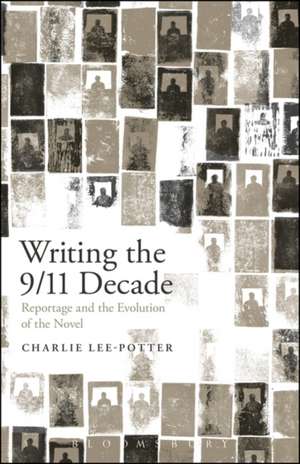Writing the 9/11 Decade: Reportage and the Evolution of the Novel
Autor Charlie Lee-Potteren Limba Engleză Hardback – 2 noi 2016
Preț: 713.72 lei
Preț vechi: 914.77 lei
-22% Nou
Puncte Express: 1071
Preț estimativ în valută:
136.63€ • 140.52$ • 113.35£
136.63€ • 140.52$ • 113.35£
Carte tipărită la comandă
Livrare economică 19 februarie-05 martie
Preluare comenzi: 021 569.72.76
Specificații
ISBN-13: 9781501313196
ISBN-10: 1501313193
Pagini: 264
Ilustrații: 8 b&w illustrations
Dimensiuni: 140 x 216 x 24 mm
Greutate: 0.43 kg
Editura: Bloomsbury Publishing
Colecția Bloomsbury Academic
Locul publicării:New York, United States
ISBN-10: 1501313193
Pagini: 264
Ilustrații: 8 b&w illustrations
Dimensiuni: 140 x 216 x 24 mm
Greutate: 0.43 kg
Editura: Bloomsbury Publishing
Colecția Bloomsbury Academic
Locul publicării:New York, United States
Caracteristici
As both a literary scholar and an established news journalist, foreign correspondent and BBC broadcaster, Charlie Lee-Potter is ideally placed to write this book, uniting journalistic knowledge with the historical gaze of the critic
Notă biografică
Charlie Lee-Potter is a British journalist and broadcaster, as well as visiting tutor in English Literature at Lady Margaret Hall and Hertford College, University of Oxford, UK. She has been a foreign correspondent and news reporter and has presented many BBC Radio 4 news and current affairs programmes, including PM, The World at One, The World This Weekend, The World Tonight and the network's respected literature programme, Open Book.
Cuprins
List of Illustrations Acknowledgements Introduction Chapter 1: Richard Ford and Ian McEwan: Transactors and Redeemers Chapter 2: Narratives of Retrogenesis and Abstraction Chapter 3: Paul Auster: After the Past Chapter 4: The Long View Chapter 5: The End of the Decade Coda: In the Realm of the Real Bibliography Artworks Index
Recenzii
Writing the 9/11 Decade takes a unique approach by situating 9/11 novels within the larger contexts provided by journalism, art, and popular culture and supplementing its nuanced analysis of those novels with in-depth interviews from authors and other figures who played a significant role in interpreting the September 11 attacks for the American public . [It] will be of value to scholars who study collective memory and popular culture, as well as any readers interested in better understanding the ways that meaning gets made in the aftermath of collective trauma.
[A]n absolutely fascinating exploration of the period between 9/11 and Hurricane Katrina, and the reaction to make sense of that event by both journalists and novelists.
A brilliant and original post-mortem on the literary response to 9/11. Charlie Lee-Potter's searching examination of some of the key novels that were written in the aftermath of the catastrophe sheds a sometimes uncomfortable light on contemporary fiction and its uneasy relationship with journalism and the wider culture.
This is a scholarly and wise account of how writers came to terms with the unspeakable horrors of 9/11. Charlie Lee-Potter's experience in journalism, and her analysis of how authors of fiction responded to the catastrophe in New York, combine into a compelling account of how we tell a story that has changed the age in which we live.
If journalism offers the first, flawed, draft of history, fiction has time and space for a richer, more personal, response. Charlie Lee-Potter invites us to reassess the meaning of 9/11 and, through fiction, the shadow it continues to cast across our lives.
[A]n absolutely fascinating exploration of the period between 9/11 and Hurricane Katrina, and the reaction to make sense of that event by both journalists and novelists.
A brilliant and original post-mortem on the literary response to 9/11. Charlie Lee-Potter's searching examination of some of the key novels that were written in the aftermath of the catastrophe sheds a sometimes uncomfortable light on contemporary fiction and its uneasy relationship with journalism and the wider culture.
This is a scholarly and wise account of how writers came to terms with the unspeakable horrors of 9/11. Charlie Lee-Potter's experience in journalism, and her analysis of how authors of fiction responded to the catastrophe in New York, combine into a compelling account of how we tell a story that has changed the age in which we live.
If journalism offers the first, flawed, draft of history, fiction has time and space for a richer, more personal, response. Charlie Lee-Potter invites us to reassess the meaning of 9/11 and, through fiction, the shadow it continues to cast across our lives.
